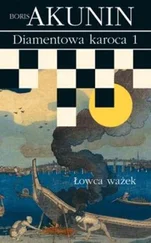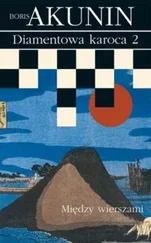As the general listened to his assistant, his face grew brighter but, having begun on a bright note, Fandorin concluded his optimistic discourse on a gloomy one.
‘The crash on the Tezoimenitsky Bridge frightens me more than the loss of our navy squadron. Without a fleet, at least we will just about win the war, but if tricks like this start happening on the main railway line supplying the front, Russia is done for. Have them couple the inspector’s carriage to a locomotive. Let’s go and take a look.’
The fifth syllable, which features an interesting passenger
By the time the inspector’s carriage reached the scene of the disaster on the rocky banks of the Lomzha river, night had grown weary of pretending to be dark at all, and the clear morning light was streaming down from the sky in all its glory.
A quite incredible amount of top brass had gathered at the stub end of the Tezoimenitsky Bridge – the Minister of War, and the most august Inspector General of Artillery, and the Minister of Railways, and the Chief of the Gendarmes Corps, and the Director of the Department of Police, and the Head of the Provincial Gendarmes Department. There were as many as half a dozen saloon carriages, each with its own locomotive, drawn up one after another in a queue.
There, above the precipice, gold braid glittered, spurs and adjutant’s aiguillettes jingled, imperious bass voices rumbled peremptorily, and down below, at the water’s edge, chaos and death prevailed. Rising up in the middle of the Lomzha was a shapeless heap of wood and iron, with the broken bones of the bridge drooping down over it; one of the mangled and twisted locomotives had buried its nose in the far bank and was still smoking, while the rectangular black tender of the other protruded from the water like a cliff. The wounded had already been taken away, but there was a long line of dead lying on the sand, covered with tarpaulins.
The latest heavy guns, intended for the Manchurian army, had tumbled off the flat wagons: some had sunk and some had been scattered across the shallows. On the opposite bank a mobile crane was jerking its jib absurdly as it tugged at the mounting of a monster with a twisted barrel, but it was obvious that it could not cope and would never pull it out.
Leontii Karlovich set off towards the topmost brass, but Fandorin skirted round the islet of gold epaulettes and walked up to the very edge of the cliff. He stood there for a while, looking, then suddenly started climbing down the inclined surface. Down by the water, he leapt agilely on to the roof of a submerged carriage, and from there clambered on to the next support of the bridge, from which the crooked rails were dangling. The engineer scrambled up the sleepers as if they were the rungs of a ladder, and was soon on the far side of the river.
There were fewer people here. Standing some distance away, about fifty paces, was an express train – the one that had managed to slip across the bridge just before the collapse. The passengers were gathered in little knots beside the carriages.
On the surviving section of the bridge and beside the water, men in civilian clothes, all dressed differently but all, nonetheless, as alike as brothers, were swarming about with a businesslike air. Among them Fandorin recognised Evstratii Pavlovich Mylnikov, with whom he had once worked in Moscow.
A gendarme corporal in a wet, torn uniform was standing rigidly to attention in front of Mylnikov – it looked as if his report was already in full spate. But the court counsellor was not looking at the corporal, he was looking at Fandorin.
‘Bah,’ he said, throwing his arms wide, as if he was about to embrace the engineer. ‘Fandorin! What are you doing here? Ah, yes, you’re in the RGD now, they told me. Sorry for invading your territory, but it’s an order from the very top: investigate as a matter of emergency, involve all the contiguous departments. Got us up out of our feather bed. Go get ’em, they said, pick up that trail, you old bloodhound. Well, the part about the feather bed’s not true.’ Mylnikov bared his yellow teeth in what should have been a smile, but his eyes remained cold and narrowed. ‘When would humble sleuths like us ever see our feather beds these days? I envy you railway sybarites. I spent the night on the chairs in the office, as I usually do. But then again, as you can see, I got here first. Look, I’m interrogating your lads, to see if it was a Japanese mine.’
‘Mr Engineer,’ the corporal said excitedly, turning to Fandorin, ‘tell His Honour, will you? Do you remember me? I’m Loskutov, I use to work in Farforovaya, on the crossing. You inspected us in winter and you were well pleased. You gave orders for me to be promoted. I did everything all right and proper, just like we’re supposed to! I climbed over the whole lot myself, ten minutes before the express. It was all clear! And how could the enemy have crept through on to the bridge? I’ve got sentries at both ends!’
‘So it was completely clear?’ Fandorin asked to make certain. ‘Did you look carefully?’
‘Why, I … Just look at that …’ The corporal choked and tugged his peaked cap off his head. ‘By Christ the Lord! Seven years … You ask anyone you like how Loskutov does his duty.’
The engineer turned to Mylnikov:
‘What have you managed to find out?’
‘The picture’s clear,’ Mylnikov said with a shrug. ‘The usual old Rooshian nonsense. The express train was travelling in front. It stopped at Kolpino and was supposed to let the special with the field guns go past. Then this telegraph clerk passes on a telegram: Carry on, the special’s delayed. Someone messed things up somewhere. As soon as the express has cleared the bridge, the army train catches up with it from behind. A heavy brute, as you can see for yourself. Should have shot across at full speed, as required, then nothing would have happened. But it must have started to brake, and the supports caved in. The railway top brass will be in for it now.’
‘Who sent the telegram about the special b-being delayed?’ asked Fandorin, leaning forward eagerly.
‘Well, that’s just it. No one sent any such telegram.’
‘And where’s the telegraph clerk who supposedly received it?’
‘We’re searching. Haven’t found him yet – his shift was already over.’
The corner of the engineer’s mouth twitched.
‘You’re not searching hard enough. Get a verbal portrait, a photo if you can, and put him on the all-Russian wanted list, urgently.’
‘The telegraph clerk? On the all-Russian list?’
Fandorin beckoned the court counsellor with his finger, took him aside and said in a quiet voice:
‘This is sabotage. The bridge was blown up.’
‘How do you make that out?’
Fandorin led the sleuths’ boss across to the break and started climbing down the dangling rails. Mylnikov clambered after him, gasping and crossing himself.
‘L-look.’
The hand in the grey glove pointed to a charred and splintered sleeper and a rail twisted like a paper streamer.
‘Our experts will arrive any minute now. They are certain to discover particles of explosive …’
Mylnikov whistled and pushed his bowler hat on to the back of his head.
The detectives hung there above the black water, swaying slightly on the improvised ladder.
‘So the gendarme’s lying when he says he inspected everything? Or even worse, he’s in on it? Shall we arrest him?’
‘Loskutov – a Japanese agent? Rubbish. Then he would have run for it, like the Kolpino t-telegraph clerk. No, no, there wasn’t any mine on the line.’
‘Then how’d it happen? There wasn’t any mine, but there was an explosion?’
‘That’s the way it is, though.’
Читать дальше









